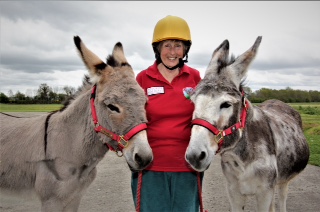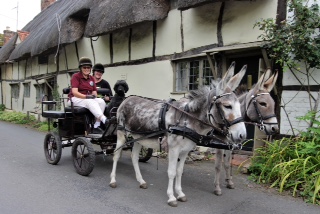Reflection – Ann Griffiths
“It is written in the Prophets: they will all be taught by God.” Jesus, in John 6:41-51.‘One of the best guarded secrets of the Island of Britain.’ Canon Donald Allchin, of the hymns of the Welsh poet Ann Griffiths.This coming week sees the anniversary of Ann Griffiths, whose short life left only seventy stanzas of her poetry, formed into some of the finest Welsh hymns ever written. A rather romanticised picture of Ann hangs in the St Melangell Centre, although no-one knows what she actually looked like, and a photo of it follows this reflection.Ann Thomas was born in 1776 on Dolwar Fach farm in Llanfihangel-yng-Ngwynfa near Llanfyllin, not far from Pennant Melangell. Her mother died in 1794, when Ann was 17 -she then ran the household and, with her father’s death in 1804, she and her brother took over the farm. In October that year Ann married John Griffiths, who joined them both there. However, after the birth of their daughter Elizabeth ten months later, Ann died aged only 29, two weeks after their baby was buried – she lived for only 24 days.Ann lived in the same farmhouse all her life and it might seem that her outlook would be very limited in those days. However, she lived in an age of great industrial and social change and was thirteen when the French Revolution began, with Britain and France being at war for almost all her adult life. Coaches also regularly ran close by, going from Chester to Aberystwyth, London to Holyhead, Bala to Shrewsbury and Cardiff to Chester – it seems that Llanfihangel residents had better links to public transport then than now!Despite her limited circumstances and hard life, Ann was a woman of faith and intellect. Canon Allchin, so much involved at Pennant Melangell, applied to her these words from a poem by Waldo Williams: ‘Beth yw byw? Cael neuadd fawr Rhwng cyfyng furiau.’‘What is living? Having a great hall Between narrow walls.’Who would have thought that a young woman from rural Wales would have written the poem ‘Rhyfedd, rhyfedd gan angylion….’ ‘Wondrous, wondrous to angels….’ which the critic Saunders Lewis called, “One of the majestic songs in the religious poetry of Europe”? Or that one of her hymns would be translated by Rowan Williams and sung at his consecration as Archbishop of Canterbury in 2002?Part of this translation from Ann’s “Yr Arglwydd Iesu” reads, “Under the dark trees, there he stands, there he stands; shall he not draw my eyes? I thought I knew a little how he compels, beyond all things, but now he stands there in the shadows. It will be Oh, such a daybreak, such bright morning, when I shall wake to see him as he is.”It may be that, as we continue to emerge from the shades and gloom of the pandemic, we may glimpse Jesus standing in the shadows because of what’s been experienced in the solitude and isolation that was necessary. Or, that life during the pandemic has taught us many lessons, not least to see things as they really are with having to remove the rose tinted glasses we sometimes prefer to wear. Just as Ann – or Melangell in this valley, or Mary Jones walking 26 miles to Bala to get a Welsh Bible – was not defined or confined by circumstances, so we need not be. What new horizons might develop spiritually for us if, like Ann Griffiths, we look and hope for the bright morning that will surely come?With my prayers; pob bendith,Christine, Guardian.



